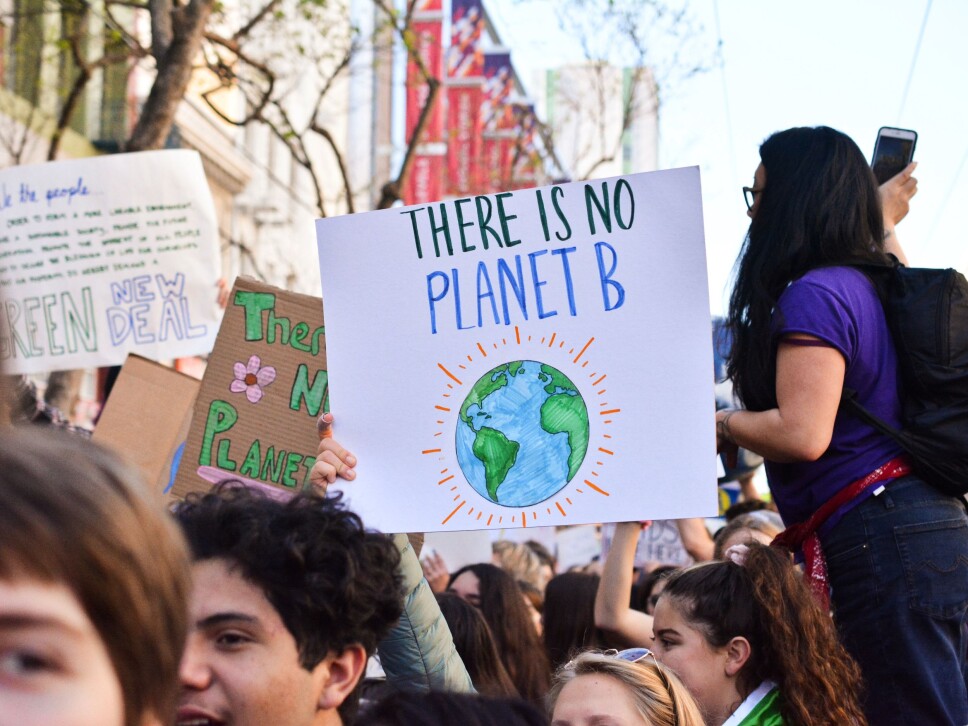
Learning from corona: Climate change, security and justice
Just as the coronavirus, climate change is an existential threat that requires urgent measures. So why are we not treating it with the same kind of urgency, asks GLOBUS researcher Thomas Diez.
This blog post is a part of a series of commentaries on the Covid-19 pandemic and the implications for the EU's global role.
As the Covid-19 pandemic is moving towards a new phase and many countries are slowly easing the lockdown provisions, other issues are coming to the forefront of the political debate again. One of them is the issue of climate change, which, thanks to movements like Fridays for Future, was on the top of the agenda before the coronavirus appeared on the stage.
It is undisputed that corona has had a positive effect on climate change, at least temporarily. As most of us had to stay at home, car traffic has gone down significantly, planes have been grounded on airport runways, and the additional energy used at home was more than offset by the downturn in industrial production.
As a consequence, Germany, for instance, may be able to reach its own target of reducing emissions by 40 per cent compared to 1990 – a goal that seemed out of reach only a few months ago. Climate NGOs therefore see the effects on climate change as a ‘silver lining’ in the current crisis.
Linking climate change to security and justice
At the same time, these effects will quickly evaporate if measures to rebuild economic strength after the corona-crisis has passed do not systematically take into account their effects on greenhouse gas emissions.
The NGO Climate Action urges us to use Covid-19 as a catalyst towards ‘putting health equity at the heart of all policymaking and drastically changing the way we live and consume in order to reduce global emissions’.
Indeed, debates about anti-corona measures in many countries have focused on adequate treatment of the elderly and those with existing illnesses. They have linked questions of protection and human dignity, of security and justice.
If we did the same in relation to climate change, the 1.5-degrees limit to global warming enshrined in the Paris Agreement would no longer look fanciful.
Supporting justice with security claims
But alas we do not.
Theorists of climate justice have long argued that those who have produced climate change in the first place need to take more responsibility, that those most affected need more assistance and that the fate of future generations needs to be included in our deliberations of climate policies. They have thus developed the Polluter-Pays-Principle and the notion of intergenerational justice that should inform the debate and our behaviour. The Fridays for Future movement has been raising similar demands in their demonstrations.
So far, these demands have been greeted with a lot of vocal support but little action. The one thing we seem to be best at when discussing climate change, is pointing the finger at others yet claim justice for ourselves.
Many climate activists are asking why that is. The coronavirus, seen from the perspective of securitisation theory, can provide an answer. Justice claims work best if they are supported by security claims. And while many issues may be turned into security issues, some are ‘more security’ than others.
Securitisation theory has identified existentialism and urgency as two core features of successful claims to security. Covid-19 has demonstrated both. People have been dying, with social media making us painfully aware of bodies piling up in overburdened funeral institutes, and the virus was spreading with immense speed until lockdown measures set in. This made it nearly unavoidable to turn Covid-19 into a security threat that legitimised infringements on personal liberties to degrees not seen since decades. It also reminded us of the justice obligations we have to the infirm and elderly.
Climate change is a security issue
Climate change is also a security issue.
The United Nations Security Council is debating global warming, it is part of most if not all national or regional security strategies, and many would agree that we would have to do something about it urgently.
Yet, in contrast to Covid-19, the effects of climate change are a lot more diffuse, despite concrete weather changes and local environmental disasters, and they are mostly long-term. Claiming justice for people in the future who will be existentially threatened decades down the line is different from protecting your own parents from a virus that may kill them, and in fact myself, tomorrow. In the words of Mark Beeson, ‘there’s nothing quite like the threat of one’s imminent demise […] to focus the attention’.
Perhaps our inaction is a result of our laziness in imagining societal bonds and responsibilities beyond the present and immediate past and future, or our lack of empathy for someone we are unable to visualise.
However accurate the comparison of Covid-19 and climate change in terms of security and justice implications may be, it is going to be difficult to turn verbal endorsement into physical action until we find ways to think in new time frames that allow us to see climate change as the existential threat that it is, demanding urgent and concrete countermeasures now.
Learning from corona
Yet, in all of this, we should also not forget that security comes with a downside: it limits the political debate, marginalises or even excludes those with alternative views, and restricts freedom. Dealing with the coronavirus has thus severely constrained not only personal liberties, but also democratic procedures.
And the lockdown has affected low-income workers, families with children and the children themselves more than others, despite any state compensation.
This should serve as a reminder of the ambiguities of enhancing our justice claims with security references.
Learning from the coronavirus thus also means to find ways of securitising climate change more effectively, and giving future generations a presence in our current debates.
At the same time, we must insist on the primacy of democracy, and maintaining basic principles of mutual recognition in the ability to access public debates, as well as in the distribution of the burdens imposed by mitigating measures and climate change itself.
References:
Franziskus von Lucke: O justice, where art thou? Developing a new take on climate justice, GLOBUS Research Paper 1/2017. http://dx.doi.org/10.15496/publikation-18224
Barry Buzan, Ole Wæver and Jaap de Wilde: Security: A New Fraework for Analysis (Boulder, CO: Lynne Rienner), 1998
Thomas Diez, Franziskus von Lucke and Zehra Wellmann: The Securitisation of Climate Change: Actord, Processes, and Consequences (London: Routledge), 2016.
———









